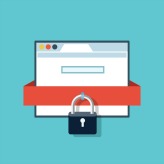Protecting yourself, your employees and your business when you’re using the Internet is mandatory if you want to remain safe, productive and profitable. The current climate dictates that we all need to ramp up our online security measures thanks to the proliferation of phishing scams, hacks and fraudulent activity. The days of viruses causing your […]
 Protecting yourself, your employees and your business when you’re using the Internet is mandatory if you want to remain safe, productive and profitable. The current climate dictates that we all need to ramp up our online security measures thanks to the proliferation of phishing scams, hacks and fraudulent activity. The days of viruses causing your PC to run sluggishly are long gone – today there are issues that can pose a very real threat to your livelihood. Here we look at some ways to bolster security.
Protecting yourself, your employees and your business when you’re using the Internet is mandatory if you want to remain safe, productive and profitable. The current climate dictates that we all need to ramp up our online security measures thanks to the proliferation of phishing scams, hacks and fraudulent activity. The days of viruses causing your PC to run sluggishly are long gone – today there are issues that can pose a very real threat to your livelihood. Here we look at some ways to bolster security.
Keeping your data safe is crucial for any small to medium-sized business. Back in the good old days when paperwork, ring binders and print outs were the norm, you wouldn’t have dreamed of leaving classified data lying around for all and sundry to see. Imagine the furor if you left a list of employee salaries lying face up on a desk. Think of the damage an employee with a grudge could do if they were able to flip through private files whenever they pleased. Now, just because your data is stored on your computers, servers and in the cloud, that doesn’t make it impenetrable. If anything it makes it available to absolutely anyone, anywhere, who has the desire and capabilities to hack into your system.
One thing you should be doing to protect your data – and your company – is to make use of privacy-protecting browser extensions. Depending on the nature of your business, both you and your employees are likely to be online at least some, if not all, of the working day. And that makes you vulnerable to attack. But what are some of the browser extensions that are out there?
Prevent browser tracking
If you don’t like the idea of a third party (reputable or otherwise) being able to track your browsing habits, try installing a tool which offers private browsing. These programs offer protection against tracking by blocking third party cookies as well as malware. Some extensions also boast secure Wi-Fi and bandwidth optimization and can guard against tracking and data collection from social networking sites such as Twitter, Facebook or Google+.Blocking adverts
While online ads may seem harmless, the truth is that they can contain scripts and widgets that might send your data back to a third party. A decent ad blocking program will block banner, rollover and pop-up ads, and also prevent you from inadvertently visiting a site that is known to contain malware. Many blockers contain additional features such as the ability to disable cookies and scripts used by third-parties on a site, the option to block specific items, and even ‘clean up’ Facebook, and hide YouTube comments. The major blockers work with Google Chrome, Safari and Firefox and you’ll be able to find everything from user-friendly solutions to more advanced tools that are customizable down to the tiniest degree. Do be aware, however, that not configuring your ad blocker properly can cause websites to ‘break’, making them unusable.Consider installing a VPN
Unfortunately browser tracking, malware and adware are not the only Internet nasties that you need to be concerned about, but the good news is that there a number of other extensions that you can download to really get a grip on your online safety. A VPN (Virtual Private Network) is something else to consider. VPNs encrypt your Internet traffic, effectively shutting out anyone who may be trying to see what you’re doing. Commonly used in countries such as China where the Internet is heavily censored by the powers that be, a VPN allows for private browsing as well as enabling users to access blocked sites – in China’s case that’s anything from blogs criticizing the government to Facebook and Instagram. There are a huge number of VPNs on the market so do a little research and find one that suits you best.Finally, it goes without saying that having anti-virus and anti-malware software installed on your PC, tablet and even your smartphone is crucial if you want to ensure your online safety.
If you’d like to know more about staying safe on the Internet or would like to schedule a security assessment for your company, get in touch with us today.
